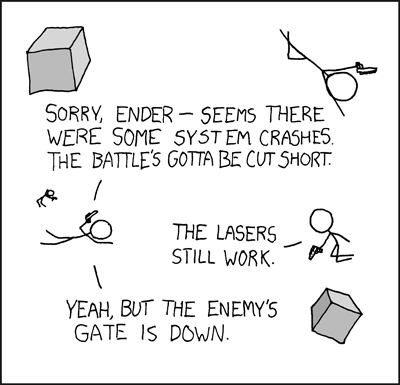 At the age of six, Ender Wiggin is taken to Battle School. He's a Third, the third child in a family of geniuses and he might be the human race's last hope of survival against the invasion of the buggers. At the school, Ender devises battle tactics that no one has even dreamed of, all the while being manipulated into isolation by his teachers. If Ender is to become Earth's saviour, he must learn to count on no one but himself, no matter what the cost.
At the age of six, Ender Wiggin is taken to Battle School. He's a Third, the third child in a family of geniuses and he might be the human race's last hope of survival against the invasion of the buggers. At the school, Ender devises battle tactics that no one has even dreamed of, all the while being manipulated into isolation by his teachers. If Ender is to become Earth's saviour, he must learn to count on no one but himself, no matter what the cost.Be prepared for a rave: I loved this book. I loved the story and I loved the experience of reading it. I often bring up my current read in conversations with people and the titles I recite are usually met with a light frown, an "Oh, yes? No, I don't know it." (Unless they're a YA blogger!) But with Ender's Game, I elicited beatific smiles and knowing nods. "Ah, yes," they'd say. "Ender's Game. What bit are you up to?" Not since I read Shantaram by Gregory Roberts have I experienced this odd socialness that comes from reading a well-loved book. It's strange and pleasing to find that just about everyone you run into has read and loved your current read. It's also rather irritating to learn that they've been keeping a such a gem to themselves instead of telling you about it.
Being a Third in Card's imagining of the world is to be something less than human. Ender exists to fulfill the promise of his parents' genes. Though only six, Ender has learned to expect little love from his peers, an expectation that sharpens his battle instincts. He affects cold calculation and little mercy when it comes to stemming the violence directed at him, but inside he fears the worst: that he is no different from his cruel older brother, Peter. It is to escape from Peter, and out of love for his sister, Valentine, that Ender consents to attend battle school.
I was reminded of certain themes in The Hunger Games while reading this book: children being exploited by adults in violent ways. It's Ender's love for his sister, like Katniss's love for hers, that becomes the driving force behind his actions. And while Ender is busily devising new and thrilling ways to defeat his peers in the battle room in zero gravity, Valentine and Peter, back on Earth, are attempting to take over the world. Both geniuses themselves, they develop aliases and begin to publish political commentaries on the "nets". Double-thrill here: writers doing cool stuff! Geekfest overload!
There are as many heart-breaking moments as there are thrilling moments in this novel; the moments when you see not soldiers, but small boys and girls pushed to their limits and manipulated without their knowledge; Petra's (one of Ender's peers) desperate "Tell Ender I'm sorry! Tell him I'm sorry!" when she burns out mid-battle. Card tells his story simply and with dry humour--especially when the adults are speaking--one of startling complexity in regard to both its characters and political backdrop. There's always a danger that military sci-fi will stray into right-wing propaganda, but Ender's Game hinges on its morality: the terrible price of winning, and deeds that can never be undone.
Neither children's nor adult fiction, this book straddles multiple demographics. It's perfect for young adults. Those of you who are looking for a dystopian-esque novel to ease the ten month wait until the third Hunger Games book (oh, how shall we do it! Ten months!) should go out and get this book right now. I can't recommend it enough.
~~
An excerpt from the end of chapter four:
One of the teachers near [Graff] said, "Is that the one?"
"God knows," said Graff. "If Ender isn't him, then he'd better show up soon."
"Maybe it's nobody," said the teacher.
"Maybe. But if that's the case, Anderson, then in my opinion God is a bugger. You can quote me on that."
"I will."
They stood in silence a while longer.
"Anderson."
"Mmm."
"The kid's wrong. I am his friend."
"I know."
"He's clean. Right to the heart. He's good."
"I've read the reports."
"Anderson, think what we're going to do to him."
Anderson was defiant. "We're going to make him the best military commander in history."
"And then put the fate of the world on his shoulders. For his sake, I hope it isn't him. I do"
"Cheer up. The buggers may kill us all before he graduates."
Graff smiled. "You're right. I feel better already."
~~
A little xkcd humour for those of you who have read Ender's Game:
